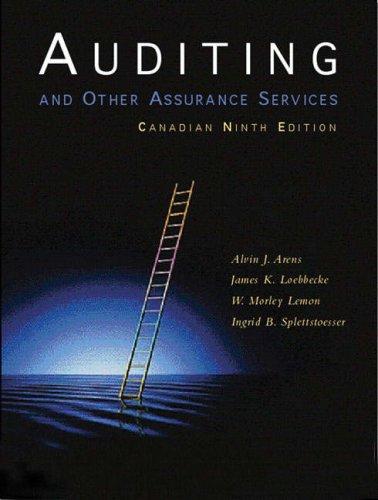The following are general questions about internal control. Choose the best response. a. When considering internal control,
Question:
The following are general questions about internal control. Choose the best response.
a. When considering internal control, an auditor must be aware of the concept of reasonable assurance which rec¬ ognizes that the
(1) employment of competent personnel provides assurance that management's control objectives will be achieved.
(2) establishment and maintenance of internal control is an important responsibility of the management and not of the auditor.
(3) cost of internal control should not exceed the benefits expected to be derived therefrom.
(4) separation of incompatible functions is necessary to ascertain that the internal control is effective.
b. When an auditor issues an unqualified opinion, it is implied that the
(1) entity's internal control is in conformity with criteria established by its audit committee.
(2) entity has not violated provisions of the Canada Busi¬ ness Corporations Act.
(3) likelihood of management fraud is minimal.
(4) financial records are sufficiently reliable to permit the preparation of financial statements.
c. Taylor Sales Corp. maintains a large full-time internal audit staff that reports directly to the audit committee. Audit reports prepared by the internal auditors indicate that the system is functioning as it should and that the accounting records are reliable. The public accountant will probably
(1) eliminate tests of controls.
(2) increase the depth and study and evaluation of con¬ trols related to achievement of Taylor Sales Corp.'s corporate policies.
(3) avoid duplicating the work of the internal audit staff.
(4) place reliance on the work of the internal audit staff.
d. What is the independent auditor's principal purpose in obtaining an understanding of internal control and assessing control risk?
(1) To maintain a state of independence in mental atti¬ tude in all matters related to the audit.
(2) To comply with generally accepted accounting prin¬ ciples.
(3) To obtain a measure of assurance of management's efficiency.
(4) To determine the nature, timing, and extent of subse¬ quent audit work.
(AICPA adapted)
Step by Step Answer:

Auditing And Other Assurance Services
ISBN: 9780130091246
9th Canadian Edition
Authors: Alvin Arens, James Loebbecke, W Lemon, Ingrid Splettstoesser





